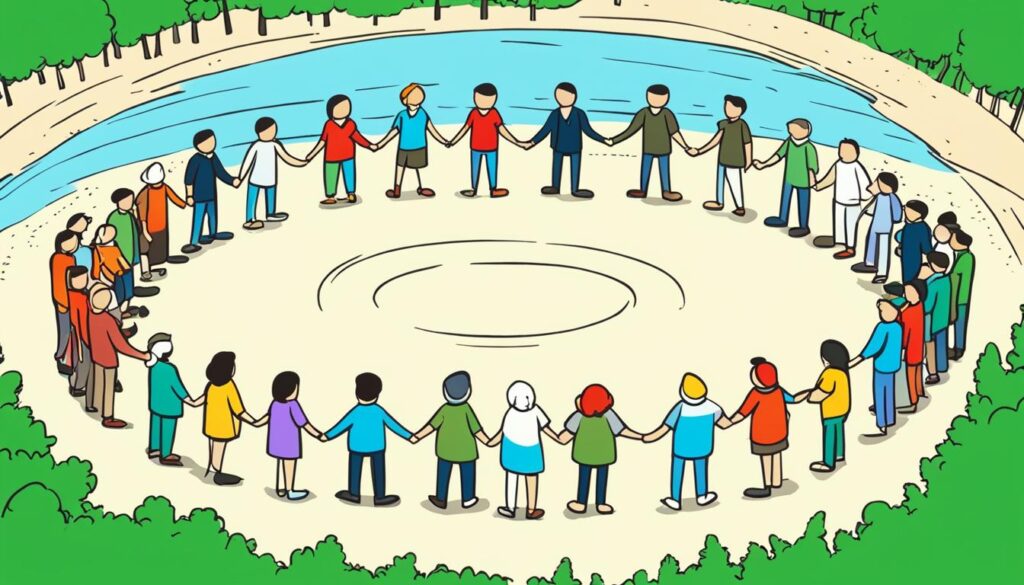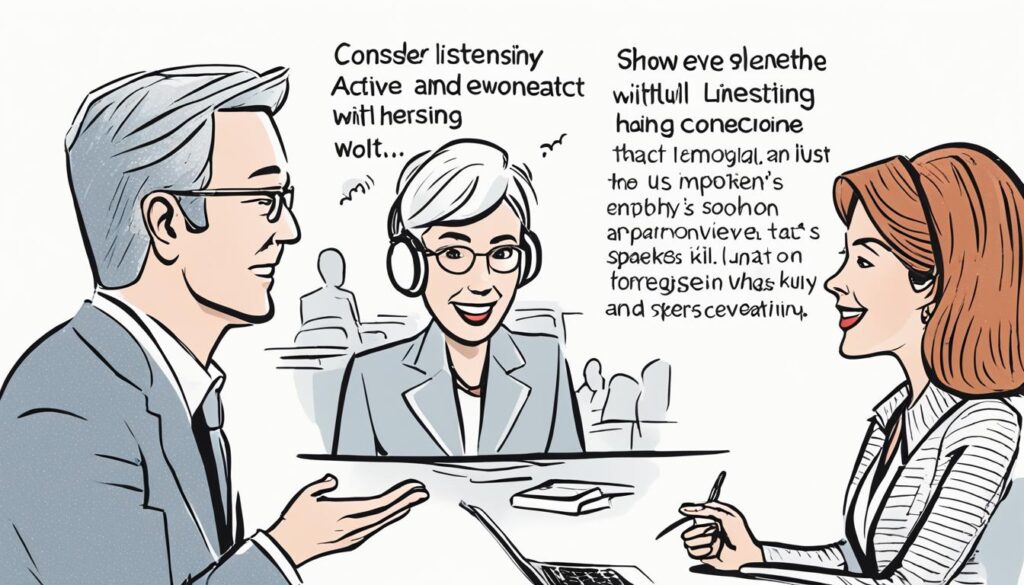I have always been captivated by the power of words and their ability to shape our interactions and perceptions. Language is a dynamic tool that allows us to express our thoughts, emotions, and intentions. However, there are moments when finding the right words becomes a challenge, especially when trying to convey that something “doesn’t make sense.” In such situations, it is essential to explore alternative phrases and expressions to express our lack of understanding effectively.
Let’s dive into the realm of sense-making alternatives, discovering the rich tapestry of synonyms, phrases, and wording choices that can help us navigate conversations with grace and professionalism. By embracing these alternatives, we can foster stronger connections, minimize misunderstandings, and promote effective communication.
Key Takeaways:
- Explore the power of alternative phrases and expressions to convey the lack of understanding.
- Choose language that is appropriate for the context, whether formal or informal.
- Be mindful of the impact our words can have on interpersonal relationships.
- Utilize alternative questions to gauge comprehension and encourage active engagement.
- Improve communication skills through active listening and empathetic responses.
Please Explain Further (Formal)
In more formal situations, it is recommended to use the phrase “please explain further” as a polite alternative to “doesn’t make sense. This allows you to ask for clarification without criticizing or pointing out flaws.
For example, you can use this phrase in an email to your employer or coworker, expressing your need for more explanation to better understand a topic or task.
Dear [Employer/Coworker’s Name],
I appreciate your earlier explanation but I am still seeking more clarity on the matter. Could you please explain further?
Thank you for your support.
Best regards,
[Your Name]
By using the phrase “please explain further“, you convey a respectful tone and express a genuine desire to gain a deeper understanding. This approach fosters a positive and professional atmosphere in the workplace, encouraging open communication and knowledge-sharing.
I Don’t Quite Follow (Informal)
In informal settings, when trying to express that something “doesn’t make sense,” there is a friendlier alternative — “I don’t quite follow.” This phrase carries a softer tone and avoids sounding accusatory or critical, making it a more suitable option when conversing with coworkers or peers.
Using “I don’t quite follow” allows you to convey your confusion or lack of understanding without causing offense or creating tension in the conversation. It shows that you are genuinely interested in comprehending the subject matter and encourages the speaker to provide further clarification.
However, it’s important to consider the power dynamic and maintain professionalism when communicating with superiors. In these situations, it may be more appropriate to frame your confusion in a respectful manner, such as requesting additional information or politely asking for further explanation.
By employing this informal yet friendly phrase, you can foster a positive and collaborative environment in which open dialogue and understanding can flourish.
In informal settings, I prefer to say, “I don’t quite follow,” when something doesn’t make sense. It’s a gentler way to express my confusion and encourages further explanation without sounding critical or dismissive. It helps create a comfortable and open environment for effective communication.
| Phrases to Express Lack of Understanding | Level of Formality |
|---|---|
| I don’t quite follow | Informal and friendly |
| If you wouldn’t mind clarifying | Polite and professional |
| Not quite clear | Informal |
| I don’t understand | Informal |
Is It Rude to Say “Doesn’t Make Sense”?
The phrase “doesn’t make sense” is like a thunderstorm that disrupts the harmonious rhythm of a conversation, causing discomfort and frustration. In both formal and informal contexts, such a blunt expression can create an undesirable atmosphere. The artistry of language lies in our ability to convey our thoughts tactfully and sensitively.
When faced with a lack of comprehension or confusion, it is crucial to choose words that foster understanding and preserve positive relationships. Politeness is the gentle breeze that soothes the intensity of a misunderstanding, allowing for clarity and connection.
Instead of relying on the abrasive phrase “doesn’t make sense,” we can embrace alternative expressions that invite collaboration and openness. By crafting our language with care and consideration, we can transform a potential storm into a gentle rainfall, nurturing growth and understanding.
Polite Alternatives for “Doesn’t Make Sense”
Here are some alternatives that you can use to express your lack of understanding without causing offense or discomfort:
- Please explain further: By requesting additional clarification, we convey a sincere desire to comprehend the subject matter better.
- I don’t quite follow: This gentle phrase acknowledges our own limitations while inviting others to provide more context or explanation.
- If you wouldn’t mind clarifying: By seeking further elaboration, we show respect for the speaker’s perspective and actively engage in the conversation.
- I don’t understand: When simplicity is key, this straightforward expression conveys our honest confusion without causing offense.
Remember, the key to effective communication lies in our ability to engage with others sensitively and respectfully. By choosing our words thoughtfully, we build bridges of understanding and nurture meaningful connections.

The Impact of Politeness
Using polite alternatives for “doesn’t make sense” can have a profound impact on our relationships and the overall communication dynamic. Politeness opens doors, promotes collaboration, and fosters a sense of trust and mutual respect. It creates a safe and welcoming space where ideas can flourish and conversations can thrive. In contrast, the directness of “doesn’t make sense” can create barriers, hindering effective communication and straining interpersonal connections.
By embracing polite alternatives, we empower ourselves to navigate complex conversations with grace and compassion. We inspire others to share their knowledge, perspectives, and insights, leading to deeper understanding and shared growth.
The Impact of Using “Doesn’t Make Sense”
Using the phrase “doesn’t make sense” can have profound consequences on interpersonal communication. When we rely on this expression to convey our lack of understanding, we risk alienating our colleagues and causing potential friction in our professional relationships. The effect on communication can be detrimental, hindering collaboration and hindering productive dialogue.
“Communication is the foundation of any successful relationship. Choosing our words carefully and considering their impact is crucial for maintaining a positive and effective communication environment.”
The consequences of saying “doesn’t make sense” can be particularly significant when responding to suggestions or instructions from others. This phrase may unintentionally convey a sense of dismissal or disregard for their ideas, leading to decreased engagement and diminished trust.
It is important to recognize that effective communication requires empathy and respect for the perspectives of others. By avoiding the use of “doesn’t make sense” and opting for alternative phrases that promote understanding and collaboration, we can foster a more positive environment where ideas are valued and relationships are strengthened.
Reevaluating our Language
Words have the power to shape our interactions and influence the outcomes of our conversations. When we choose to use alternative phrases that emphasize curiosity, openness, and a genuine desire to understand, the impact on communication can be transformative.
- Instead of saying “doesn’t make sense,” we can ask for clarification by saying, “I would appreciate further explanation to better understand.”
- Rather than dismissing an idea with “that doesn’t make sense,” we can invite discussion and deeper exploration by stating, “I’m intrigued, could you elaborate further?”
- When faced with complexity, instead of using “doesn’t make sense,” we can show vulnerability and a willingness to learn by expressing, “I’m struggling to grasp the concept. Can you break it down for me?”
By reframing our language in this way, we create an environment that encourages open dialogue, enhances understanding, and fosters deeper connections with those around us.
The Consequences of Language
Our choice of words has far-reaching implications on the quality of our relationships and the effectiveness of our communication. By relying on phrases like “doesn’t make sense,” we may inadvertently create barriers to collaboration and hinder the development of trust within our professional interactions.
Using alternative expressions can help mitigate these negative consequences. By showing a genuine willingness to understand, seeking clarification without judgment, and embracing different perspectives, we create a more inclusive and productive communication environment.
Embracing Respectful and Effective Communication
Effective communication involves more than just the transmission of information. It requires active listening, empathy, and a commitment to fostering mutual understanding. By being mindful of the language we use and its potential impact, we can enhance our interpersonal skills and build stronger relationships.
To truly overcome the pitfalls of using “doesn’t make sense,” we must embrace respectful communication by:
- Choosing alternative phrases that demonstrate curiosity and a desire to understand
- Engaging in active listening and seeking clarification when needed
- Valuing and respecting the perspectives of others
- Cultivating an inclusive and collaborative environment for communication
By adopting these practices, we can promote effective, meaningful, and trust-building conversations that lead to enhanced collaboration and successful outcomes.
| Consequence | Effect |
|---|---|
| Alienation of colleagues | Diminished trust and decreased engagement |
| Potential friction in professional relationships | Strained communication and hindered collaboration |
| Dismissal of ideas | Discouraged participation and limited creativity |
| Barriers to understanding | Obstructed progress and inefficient problem-solving |
Alternative Questions to Gauge Understanding
When seeking to assess comprehension and encourage active engagement, it is essential to explore alternative questions beyond the commonly used “does that make sense?” By employing these thought-provoking queries, we enable individuals to think critically, share insights, and seek clarification when needed. Here are some effective alternatives:
- What are your thoughts?
- How does that sound to you?
- What questions do you have about this?
- What do you think so far?
- What additional information would be helpful to you?
- Is this the kind of capability you had in mind?
- How do you think this could help?
By utilizing these alternative questions, we encourage individuals to actively participate in the conversation and express their understanding and concerns. It creates an environment conducive to open dialogue, critical thinking, and effective communication.
The Power of Thought-Provoking Queries
“Effective communication requires more than asking ‘Does that make sense?’ It demands the curiosity to explore beyond the surface and the willingness to engage in meaningful conversation.”
Asking these alternative questions sparks curiosity, inviting deeper discussions and insights that can enrich our understanding. It demonstrates our commitment to fostering a collaborative and inclusive environment where everyone’s input is valued.
Fostering a Culture of Active Engagement
When we ask alternative questions, we encourage individuals to be active participants rather than passive recipients of information. By inviting their thoughts, questions, and perspectives, we actively involve them in the communication process, strengthening engagement and collaboration.
| Benefits of Alternative Questions | Enhanced understanding | Increased engagement | Improved critical thinking |
|---|---|---|---|
| Alternative questions open doors to more comprehensive understanding by stimulating deeper analysis and exploration. | When individuals feel their opinions and insights are valued, they are more likely to engage actively in conversations. | By encouraging critical thinking, alternative questions empower individuals to develop sharper analytical skills and a broader perspective. |
The beauty of alternative questions lies in their ability to foster meaningful conversations that transcend mere comprehension. They elicit thoughtful responses and create an atmosphere where diverse perspectives are embraced and understood. This not only enhances communication but also enables us to collectively achieve greater clarity and insight.
The Pitfalls of Using “Does that make sense?”
In the realm of communication, the phrase “does that make sense?” may appear innocuous, but it carries hidden pitfalls that can hinder effective dialogue. As a writer and communicator, I have come to recognize the drawbacks and negative impact of relying on this phrase in conversations and discussions.
First and foremost, the use of “does that make sense?” can inadvertently project a sense of uncertainty on the part of the speaker. It conveys a lack of confidence in the message being conveyed, potentially undermining the credibility of the speaker. Instead of inspiring trust and assurance, this phrase can evoke doubt and hesitation in the minds of the audience. As a result, the intended message may be received with skepticism, undermining the desired impact of the communication.
Furthermore, using “does that make sense?” can inadvertently insult the intelligence and comprehension of the listener. It implies that the speaker assumes the listener is not capable of understanding the information presented. This condescension can lead to strained relationships and diminished trust in professional and personal interactions. It is crucial to treat others with respect by avoiding language that undermines their intelligence or belittles their ability to grasp concepts.
“Language has the power to shape our perceptions and relationships. By choosing our words carefully, we can build bridges of understanding or erect barriers of confusion.”
In addition, “does that make sense?” can become a filler phrase that adds no real value to the conversation. It often serves as a default question when speakers are unsure of how to engage further or seek feedback. Consequently, this phrase can contribute to the stagnation of conversation and hinder meaningful exchanges. By relying on alternative questions and actively listening to others, we can foster a more dynamic and engaging communication environment.
As thoughtful communicators, we must be mindful of the language we use and the impact it can have on our interactions. Incorporating alternative questions that encourage dialogue and demonstrate genuine interest can enhance our communication skills and establish a more connected and collaborative atmosphere.
In conclusion, using the phrase “does that make sense?” can lead to several pitfalls in communication. It can undermine the speaker’s confidence, insult the listener’s intelligence, and impede the flow of meaningful conversation. By recognizing these drawbacks and embracing alternative question strategies, we can create a more inclusive and effective communication style that fosters understanding and promotes positive relationships.
Overcoming Misunderstandings: Building Trust and Engagement
To forge meaningful connections and foster effective communication, it is imperative to overcome misunderstandings and cultivate trust and engagement. By utilizing alternative communication strategies, we can create an environment that encourages open dialogue and active participation.
One effective approach is to employ alternative questions that invite individuals to share their thoughts and perspectives. This not only demonstrates genuine interest but also encourages others to actively contribute to the conversation. By shifting our focus from simply conveying information to actively engaging with others, we can establish a foundation of trust and collaboration.
“Effective communication is not just about speaking, but also about listening, understanding, and engaging with others.”
To further build trust and engagement, it is essential to show empathy and understanding towards the thoughts and needs of others. By acknowledging their perspectives and demonstrating a willingness to address any misunderstandings, we create a safe space for open and honest communication.
In our pursuit of effective communication, it is crucial to remember that words hold immense power. By carefully selecting our language and avoiding phrases that may unintentionally cause friction or offense, we can promote a more harmonious exchange of ideas.
Nurturing Collaborative Environments
Creating a collaborative environment means embracing diverse perspectives and encouraging active participation. By fostering an atmosphere of mutual respect, we can overcome misunderstandings and build trust among team members.
It is also important to allow room for clarifications and questions, recognizing that misunderstandings can arise even with the best intentions. By promoting a culture of open dialogue, individuals feel more comfortable seeking assistance or requesting further explanations when needed.
Remember, effective communication is a two-way street. Active listening is just as important as articulating our thoughts. By truly listening to others, suspending judgment, and seeking to understand before responding, we can establish a foundation of trust and deepen our connections.
By embracing effective communication strategies and being sensitive to the impact of our words, we can overcome misunderstandings and build trust and engagement. Through genuine interest, active participation, and a commitment to open dialogue, we create an environment where collaboration thrives and effective communication flourishes.
| Effective Communication Strategies | Benefits |
|---|---|
| Using alternative questions | Encourages active participation and critical thinking |
| Showcasing empathy and understanding | Fosters trust and creates a safe space for communication |
| Nurturing a collaborative environment | Promotes teamwork and enhances productivity |
| Practicing active listening | Deepens connections and strengthens relationships |
The Importance of Active Listening
In the realm of effective communication, active listening takes center stage like a star in a theatrical play. It is the key that unlocks the door to understanding and fosters connections that echo through the corridors of our conversations. By engaging wholeheartedly with others, I embrace the power of active listening, allowing their perspectives to dance in the spotlight of my attention.
Through the art of active listening, I gracefully extend my ears and heart, resonating with the words, emotions, and unspoken messages shared by those around me. With focused intent, I absorb their thoughts and experiences, their joys and sorrows, etching a symphony of understanding in the instrument of my mind.
“Active listening is the virtuoso conductor guiding the orchestra of effective communication.”
As I immerse myself in the rich tapestry of others’ words, I not only absorb their message, but I also discover the subtleties hidden between the lines. I become attuned to the music of their voice, the cadence of their thoughts, and the harmonies of their emotions. It is in this moment, this sacred pause imbued with empathy, that understanding blossoms like a vibrant flower, radiating its beauty in the garden of connection.
With the gift of my undivided attention, I honor the person before me, weaving a tapestry of trust and respect. As the words flow, I respond with compassion and clarity, ensuring that my message harmonizes with their core, bridging any gaps that threaten to derail comprehension. Through active listening, I create a sacred space where understanding blooms, where miscommunication retreats, and where conversations transcend the ordinary to become extraordinary acts of connection.
Active Listening: A Dance of Connection
Active listening is a dance, a synchrony of mind and heart. It requires more than just hearing; it demands my presence, my curiosity, and my willingness to embrace the beauty of another’s story. Like a dancer attuned to every subtle movement of their partner, active listening invites me to move and respond in perfect rhythm, ensuring that my message lands gently on the shores of their understanding.
This dance requires the absence of judgment, for in the realm of active listening, I surrender the urge to fix, correct, or overshadow another’s experiences. Instead, I embrace the vulnerability inherent in connection, nurturing an environment where thoughts can grow, doubts can be quelled, and authentic understanding takes root.
The Elixir of Connection
With active listening as my guide, the elixir of connection flows freely, quenching the thirst for understanding and empathy. It becomes the catalyst that fosters collaboration, enhances relationships, and deeply enriches the tapestry of our human experience. Through active listening, I discover the colors of another’s thoughts, recognize the symphony of their emotions, and unravel the hidden depths of their story.
| Benefits of Active Listening | How It Enhances Communication Skills |
|---|---|
|
|
|
|
|
|
|
|
|
In a world where communication often feels like a tangled ball of yarn, active listening acts as a gentle hand, untangling the knots and revealing the beauty within. It enables me to forge meaningful connections, build bridges between differing viewpoints, and dance in harmony with the human spirit. As I embrace active listening, I become a silent conductor, shaping the symphony of understanding that nourishes our bonds and elevates our conversations to new heights.
Enhancing Communication Skills
To truly enhance our communication skills, we must go beyond mastering the surface-level mechanics of language. It’s about more than just using the right words or grammar; it’s about unlocking the power of effective language usage and developing our interpersonal skills. This involves immersing ourselves in the art of communication and continuously honing our ability to connect, understand, and convey our thoughts, emotions, and ideas.
One way to enhance our communication skills is by practicing the use of alternative phrases. By expanding our linguistic repertoire and exploring various ways to express ourselves, we become more adaptable and versatile in our interactions. Just as a painter experiments with different strokes and techniques to create a masterpiece, we can experiment with different language choices to paint a vivid picture in the minds of our listeners.
“Communication is an art form, and by embracing the palette of language, we can create masterpieces of connection, understanding, and collaboration.”
As we strive to enhance our communication skills, asking meaningful questions becomes a valuable tool. By actively engaging others in thoughtful dialogue, we demonstrate genuine interest and encourage open discussion. Thought-provoking questions invite deeper exploration, challenge assumptions, and spark new insights. They foster an environment that values collaboration and draws out the collective wisdom of the team.
In addition to using alternative phrases and meaningful questions, active listening is an essential skill to develop. When we listen with intention and focus, we not only hear the words being spoken, but also the emotions, underlying messages, and unspoken nuances. It is in the art of listening that we truly understand, connect, and bridge gaps in communication. Like a musical conductor, we harmonize with others, bringing their voices to the forefront and creating symphonies of understanding.
By continuously developing our interpersonal skills and expanding our linguistic repertoire, we can become masters of communication. We can navigate any conversation with grace, empathy, and a profound understanding of others. With effective language usage, meaningful questions, and active listening, we enrich our relationships, foster better understanding, and create a world where unity and collaboration flourish.
The Power of Effective Communication
Effective communication is not merely a means of conveying information; it is a transformative force that has the power to change lives, businesses, and the world. When we enhance our communication skills, we unlock the potential for greater connection, empathy, and collaboration. We become catalysts for positive change, inspiring others and creating a ripple effect of meaningful dialogue and understanding.
| Benefits of Enhancing Communication Skills | |
|---|---|
|
|
Enhancing our communication skills is a lifelong journey of growth and discovery. It is about embracing the power of language, mastering the art of listening, and developing the interpersonal skills necessary to build meaningful connections. By continuously honing these skills, we can create a world where understanding, empathy, and collaboration thrive, leading to a better future for all.
Conclusion
In summary, finding alternative ways to express the idea of “doesn’t make sense” is crucial for effective and respectful communication. By carefully selecting our words, understanding the context, and actively engaging with others, we can strengthen our relationships, promote better comprehension, and cultivate a positive and collaborative communication environment.
Continuously developing our communication skills is essential. It allows us to explore a range of approaches to convey confusion or lack of understanding, enabling us to establish meaningful connections and foster productive conversations. Through mindful language usage and active participation, we can build trust, enhance understanding, and create a space where everyone feels valued and heard.
In conclusion, by choosing alternative phrases and practicing empathetic listening, we can navigate potential misunderstandings, avoid rudeness, and promote a more harmonious exchange of ideas. By nurturing our communication skills, we unlock the power to build stronger connections and achieve greater clarity in our interactions.
FAQ
What are some sense-making alternatives for the phrase “doesn’t make sense”?
Some sense-making alternatives include: Please explain further, I don’t quite follow, Incomprehensible, Not quite clear, If you wouldn’t mind clarifying, Nonsensical, Unintelligible, Cryptic, Inexplicable, Absurd, I don’t understand, Makes no sense, I don’t get it, Not sure what you mean, Ludicrous, Contradictory, Unsound, Has no sense, Struggling to understand.
What is a polite formal alternative to “doesn’t make sense”?
A polite formal alternative is “please explain further.” It is a professional way to request clarification without criticizing or pointing out flaws.
How can I express lack of understanding in a friendly way?
An informal alternative to “doesn’t make sense” is “I don’t quite follow.” This phrase is less accusatory and critical, making it a better option when speaking to coworkers or peers.
Is it rude to say “doesn’t make sense”?
Using the phrase “doesn’t make sense” can often come across as rude and abrasive, especially in formal or professional settings. It is advisable to use more polite alternatives to maintain positive relationships and avoid potential misunderstandings.
What is the impact of using “doesn’t make sense” in communication?
The phrase “doesn’t make sense” can have negative consequences on interpersonal communication. It may alienate colleagues or cause friction in professional relationships. Being mindful of the impact of your words and choosing alternative phrases can help maintain positive communication.
Are there alternative questions I can use to gauge understanding and encourage engagement?
Yes, instead of asking “does that make sense?” you can use alternative questions such as “What are your thoughts?”, “How does that sound to you?”, “What questions do you have about this?”, “What do you think so far?”, “What additional information would be helpful to you?”, “Is this the kind of capability you had in mind?”, and “How do you think this could help?” These questions encourage active participation and critical thinking.
What are the pitfalls of using “does that make sense?” in communication?
Using the phrase “does that make sense?” can make the speaker seem uncertain, insult the audience, and become a filler phrase that adds no value to the conversation. Using alternative questions and being mindful of the language we use can help build trust and improve communication effectiveness.
How can we overcome misunderstandings and build trust and engagement in communication?
To overcome misunderstandings and build trust and engagement, it is important to choose words and phrases that encourage open dialogue and active participation. By using alternative questions and showing genuine interest in the thoughts and needs of others, we can foster better communication.
What role does active listening play in effective communication?
Active listening plays a crucial role in effective communication. By actively engaging with others, understanding their perspectives, and responding with empathy and clarity, we can enhance our ability to communicate and reduce the chance of misunderstandings.
How can I enhance my communication skills?
To enhance communication skills, one can practice using alternative phrases, asking meaningful questions, and actively listening to others. By continuously developing interpersonal skills and expanding linguistic repertoire, we can improve our ability to convey thoughts, feelings, and ideas effectively, fostering better understanding and collaboration.
Could you provide a summary?
Choosing alternative ways to express “doesn’t make sense” can contribute to more effective and respectful communication. By being mindful of our language, considering the context, and actively engaging with others, we can build stronger relationships, foster better understanding, and create a positive and collaborative communication environment.
Source Links
- https://www.thesaurus.com/browse/illogical
- https://wordselector.com/other-ways-to-say-doesnt-make-sense/
- https://www.pickleai.com/blog/stop-asking-does-that-make-sense-7-expert-alternatives














